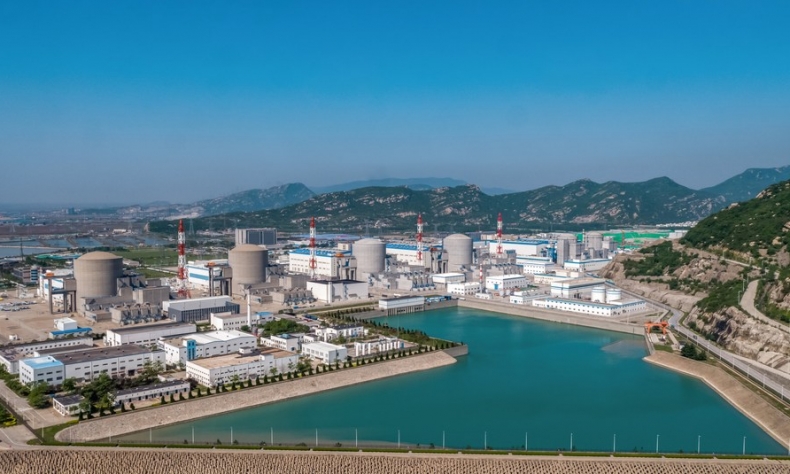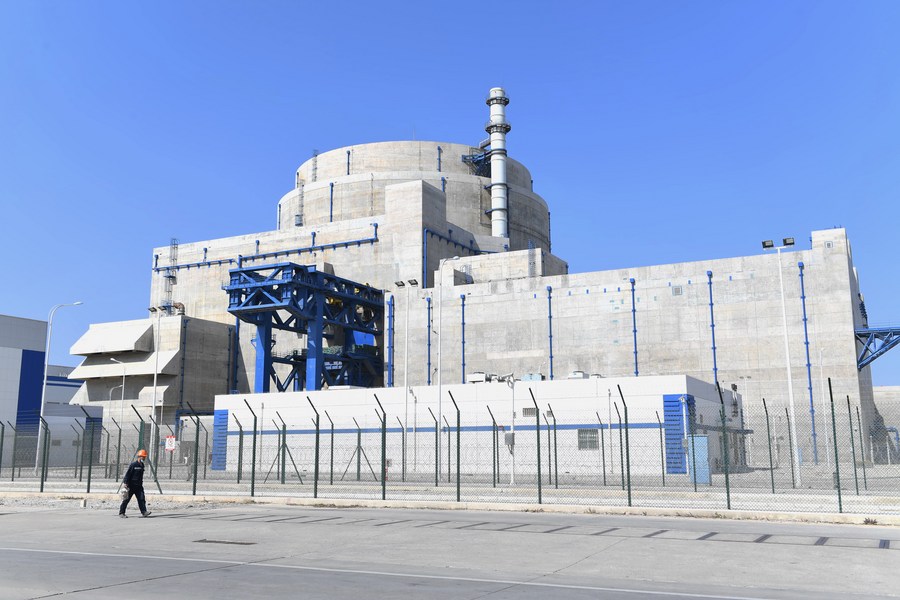China’s Nuclear Industry Sets Sights on the World Stage

In the context of the carbon peaking and carbon neutrality goals, strengthening nuclear energy cooperation among countries is of great significance in enhancing strategic mutual trust and promoting the establishment of a new global energy governance system.
Representatives from China National Nuclear Corporation (CNNC), now attending China’s annual “two sessions,” revealed the latest progress of the country’s nuclear power development and vision to expand at the world stage, as well as a strong focus on promoting green development.
Luo Qi, who is the chief engineer of the CNNC, an academician of the Chinese Academy of Engineering, is a deputy attending the first session of the 14th National People’s Congress (NPC) currently underway in Beijing. He believes nuclear science and technology are vital to China’s strategic strength in science and technology.
“The key core technology must be self-reliant,” he emphasized. “As the nuclear science and technology industry is a national strategic high-tech industry, its comprehensive basic research capabilities determine the speed and level of development of China’s nuclear industry.”
He also highlighted that the ongoing changes in the global situation had made nuclear science and technology a crucial competition area among major countries.
Luo further emphasized that nuclear power plays an important role in establishing a new development pattern, promoting green development, and ensuring China’s energy security.
“Developing advanced nuclear power technology and targeting the world’s technological frontier will enhance China’s overall scientific and technological level, help the country achieve high-level scientific and technological self-reliance and strength, and provide strong impetus for China’s high-quality economic development,” he explained.
Xin Feng, who is chairman of China Nuclear Energy Industry Corporation (CNEIC) of the CNNC and is attending the first session of the 14th National Committee of the Chinese People’s Political Consultative Conference (CPPCC), China’s top political advisory body, stated that “In addition to ensuring domestic nuclear fuel supply, we can also support the development of nuclear power globally. Firmly pursuing internationalization is our only way to become a world-class enterprise.”
Xin also mentioned that in 2022, the Chinese government approved 10 new nuclear power units, the highest yearly number in over a decade. This development would put greater demands on the nuclear fuel industry to provide stable, reliable, safe, and high-quality products to ensure the development of the entire nuclear industry supply chain, Xin added.

He believed that the rapid development of nuclear power presents both a challenge and an opportunity for the nuclear fuel industry. He expressed confidence that, with the support of China’s strong industrial system and capabilities, and the industry’s own efforts, it can fully meet the demand for the rapid development of nuclear power. Feng highlighted two key issues to achieve this goal: balancing supply and demand and promoting self-reliance without rejecting cooperation.
To realize CNEIC’s global vision, the company is taking active measures to control costs, connect with major buyers worldwide, and is determined to “go out, grab orders, and maintain steady growth.” Despite the impact of the pandemic, CNEIC has made breakthroughs in its international market development efforts by identifying opportunities and making its products more competitive.
Luo Qi added that nuclear energy “going global” is an extension of China’s diplomacy. In the context of the carbon peaking and carbon neutrality goals, strengthening nuclear energy cooperation among countries through nuclear power projects is of great significance in enhancing strategic mutual trust and promoting the establishment of a new global energy governance system.
He stated that “China’s nuclear power development has now taken a leading position in the world. From technology research and development, design and construction, equipment manufacturing, operation management to technical services, it has the ability and conditions to ‘go global’ across the entire industry chain.”
Luo also highlighted the need to accelerate the pace of nuclear power “going global,” particularly in countries along the “Belt and Road.”
However, Luo pointed out that China’s basic nuclear research resources are relatively dispersed, with low integration among nuclear research institutions. In addition, there is still a large gap in research funding and talent investment compared to developed countries and a lack of a forward-looking layout. These areas need to be strengthened to enhance the industry’s overall capabilities.
 Facebook
Facebook
 Twitter
Twitter
 Linkedin
Linkedin
 Google +
Google +










